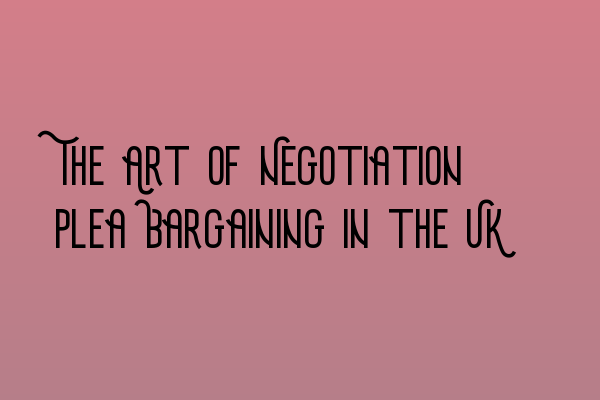The Art of Negotiation: Plea Bargaining in the UK
When it comes to criminal law proceedings in the UK, plea bargaining plays a significant role in the criminal justice system. Plea bargaining refers to the process of negotiation between the prosecution and the defense, where a plea agreement is reached through discussions and compromises. In this blog post, we will explore the art of negotiation in plea bargaining and its importance in criminal law cases.
Understanding Plea Bargaining
Plea bargaining allows defendants to avoid a lengthy trial and potential harsh sentencing by agreeing to plead guilty to a lesser charge or accepting a reduced sentence. This negotiation process is aimed at achieving a fair and efficient resolution to criminal cases.
In the UK, plea bargaining occurs at various stages of the criminal justice system, including pre-charge, pre-trial, and even during trial. It is a flexible process that allows both parties to explore different options and reach a mutually acceptable outcome.
Benefits of Plea Bargaining
The use of plea bargaining has a number of benefits for all parties involved in a criminal case.
- Efficiency: Plea bargaining helps in reducing the burden on the court system by avoiding lengthy trials. It saves valuable time and resources that can be allocated to other cases.
- Guaranteed Outcome: Defendants have the opportunity to secure a guaranteed outcome by negotiating a plea agreement. They can choose to accept a lesser charge or a reduced sentence, providing some certainty in the outcome of their case.
- Reduced Sentencing: Through negotiation, defendants may receive a lighter sentence compared to the potential punishment they would have faced if found guilty after a trial.
- Prosecution’s Perspective: Plea bargaining allows the prosecution to allocate limited resources effectively. They can focus on more serious cases while still ensuring a measure of justice is achieved in plea bargained cases.
- Victim Consideration: Plea bargaining can also take the victim’s views into account. In some cases, a plea agreement may involve restitution or other forms of resolution that benefit the victim.
Factors to Consider in Plea Bargaining
Successful plea bargaining requires careful consideration of several factors, including:
- Strength of evidence against the defendant
- Defendant’s criminal history
- Public interest in prosecuting the case
- Availability of witnesses
- Impact on victims
Understanding these factors and their relevance in a specific case can greatly influence the negotiation process and the likelihood of achieving a favorable outcome.
The Role of Solicitors in Plea Bargaining
Solicitors play a vital role in representing defendants and negotiating plea agreements. They thoroughly assess the evidence, advise their clients on potential outcomes, and negotiate with the prosecution to secure the best possible deal.
It is essential for solicitors representing defendants to have a deep understanding of criminal law, case precedent, and sentencing guidelines to effectively navigate the plea bargaining process. Continuous professional development and staying up-to-date with the latest legal developments are crucial for solicitors handling criminal law cases.
Conclusion
Plea bargaining is an art form in the criminal justice system, enabling defendants to secure more favorable outcomes while streamlining the court system. It offers efficiency, certainty, and fair resolutions for all parties involved. Solicitors with expertise in plea bargaining are invaluable in ensuring defendants receive the best possible outcome in their criminal law cases.
If you’re interested in learning more about criminal law or preparing for your SQE exams, check out these related articles:
